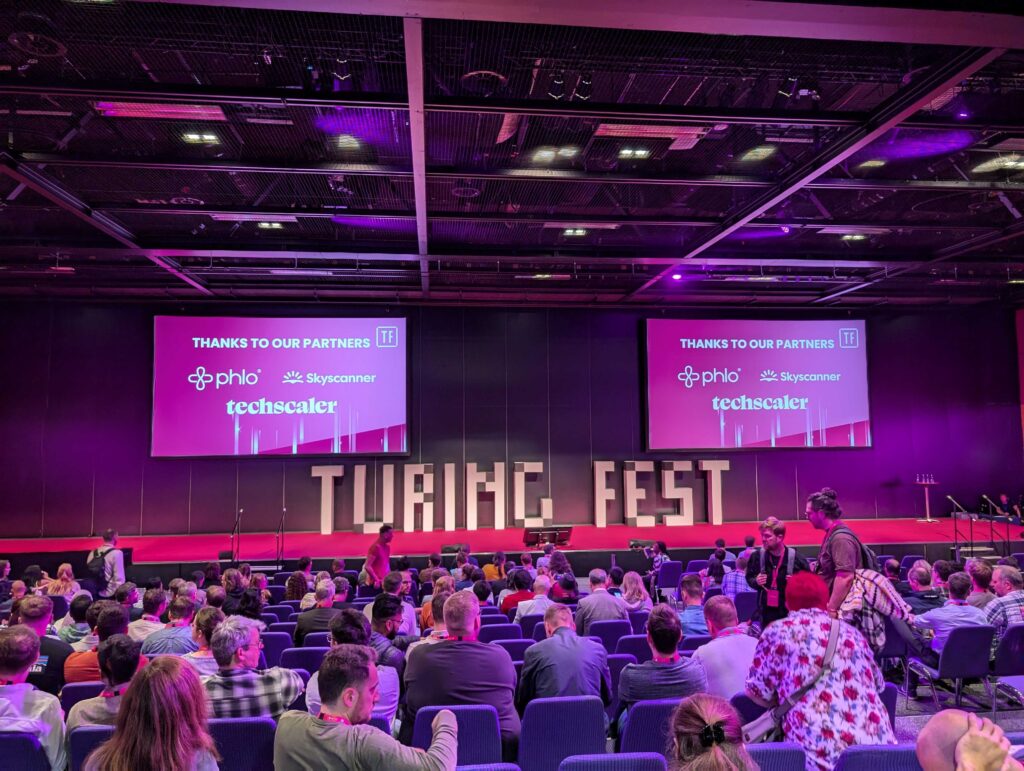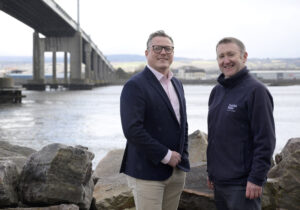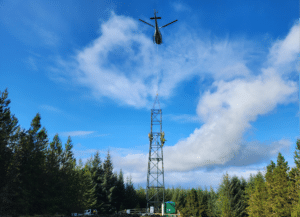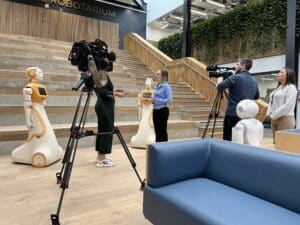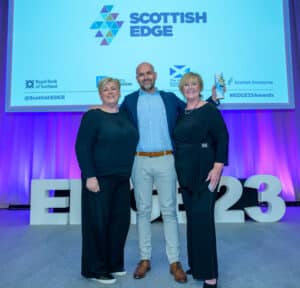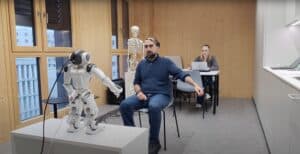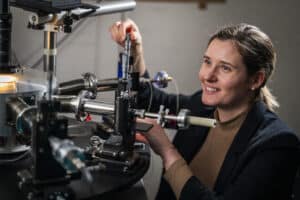For a first-time attendee, stepping into Turing Fest 2024 felt a bit like entering tech’s equivalent of Glastonbury – a bustling hive of ideas and innovation where festival veterans rub shoulders with wide-eyed newbies and everyone wants to appear vaguely knowledgeable about the headliners’ first body of work.
Navigating the sea of talks, expo stands, and well-caffeinated networking types, I truthfully felt a mix of excitement and mild trepidation. This week, the EICC traded its usual corporate beige for a flood of neon pink, transforming its labyrinthine halls into a vibrant tech playground. Yet, as the event doors swung open, news simultaneously broke of Dyson’s plans to cut a third of its UK workforce – a stark reminder of the industry’s volatile nature.
Against this backdrop, the corridors buzzed with conversations about AI, economic pressures, and the ever-evolving tech landscape, mirroring the sector’s current state of both anticipation and uncertainty.
For the next two days, between a smattering of self-congratulatory tech bros, there were genuine moments of insight that made traversing the extensive event app worthwhile. From marketing masterclasses to fireside chats on AI’s impact, the event offered a smorgasbord of insights for attendees, including lesser-spotted comms professionals like myself.
So, what did this PR person glean from hanging out with (read: in the vicinity of) some of the finest tech folk the world has to offer? Here are my five key takeaways for fellow comms people:
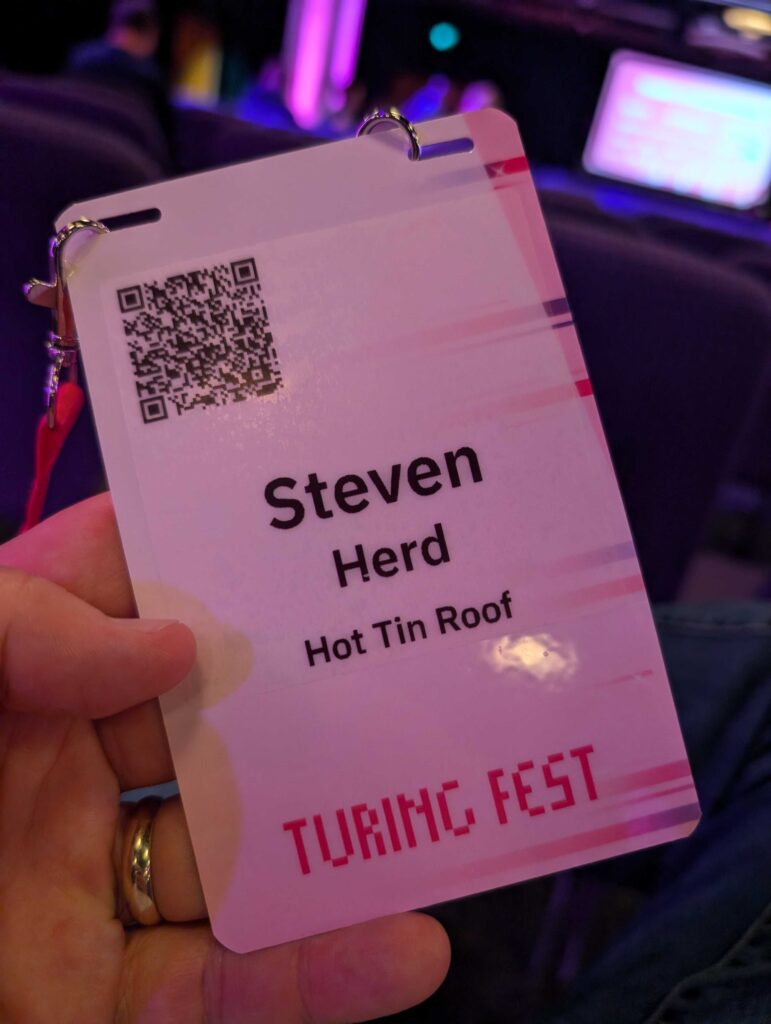
1. If AI was a person, it would own a ‘Live Laugh Love’ sign
Bethan Vincent’s talk was a refreshing dose of reality amongst the near-constant AI hype. Her assertion that ‘taste’ will be a marketer’s most valuable USP in the age of AI isn’t just relevant to marketing – it’s a wake-up call for all communications professionals.
Here’s the thing: AI might be able to churn out content faster than we can say “engineered prompt”, but it has the aesthetic sensibility of your Aunty Debbie who thinks inspirational quotes on driftwood are the height of interior design. AI can’t distinguish between a masterpiece and a paint-by-numbers kit. It doesn’t understand why we cringe at certain phrases or why some images resonate while others fall flat.
That’s where we come in. Our ability to discern good taste from bad, to recognise nuance, and to understand the subtle cultural cues that make communication truly effective – that’s our superpower. In PR, this means we need to double down on crafting narratives that resonate on a human level, even when discussing the most complex technologies.
2. Simple, effective language isn’t just for selling sex toys
Emma Stratton‘s session on conveying complex ideas simply was a masterclass in effective communication, drawing from her diverse experience that spans from Ann Summers to B2B tech companies. Her journey from marketing adult sex toys to explaining intricate software solutions proves one thing: clear, engaging language is universally powerful.
Stratton’s BBQ test – explaining your product as if you were at a casual ‘cookout’ – is brilliantly applicable whether you’re describing a vibrator or a virtualisation platform. The principle remains the same. Cut through the jargon and connect with your audience on a human level.
In the world of B2B tech PR, we often see fellow comms folk fall into the trap of hiding behind complex terminology, thinking it makes us sound more professional or knowledgeable. But Stratton’s experience shows that the real skill lies in making the complicated simple and the technical relatable.
3. If your work isn’t contributing to the bottom line, I’ve got bad news for you
Matt LeMay‘s insights on connecting work to company goals hit harder than a client’s annual review deadline. For us B2B PR agency folks, his message was crystal clear: if we can’t draw a direct line from our efforts to our clients’ success, we might as well be pitching press releases into the void.
LeMay’s insistence that goals should never be more than one step removed from company objectives isn’t just sound advice – it’s a client retention strategy. In today’s economic climate, the days of ‘awareness’ campaigns and vanity metrics are as outdated as faxing a pitch.
For agency professionals, this means we need to take a hard look at our client strategies. Are we just clocking billable hours, or are we driving tangible business outcomes for our clients? Every pitch, every campaign, every piece of content should be able to answer the question: “How does this impact our client’s bottom line?”
4. The only constant is going to be change
Edinburgh served up some pretty atrocious weather during the event, even by Scotland’s typically dreich standards of what qualifies as ‘Summer’. If Turing Fest were a weather forecast, it would read: “expect rapid and unpredictable shifts with a high chance of disruption.”
In the world of tech PR, we’re not just weathering the storm of change – we’re trying to surf it. One minute you’re crafting the perfect SaaS pitch, the next you’re explaining why AI won’t steal everyone’s jobs. It’s less about predicting the future and more about being ready to pivot at pace.
This constant state of flux means our skill set needs to be as flexible as ever. We need to be part journalist, part futurist, and part translator – turning complex tech innovations into stories that resonate with broad, evolving audiences whilst ensuring client messaging is always on point.
5. It’s not all doom and gloom – hurrah!
April Dunford‘s palette cleansing end-of-day Q&A offered a refreshing counterpoint to the cascade of expert opinions and predictions. Her key message? Don’t take any single piece of advice as gospel, no matter how convincing the speaker. In a world of conflicting tech trends and strategies, this perspective is gold for PRs.
Dunford emphasised that what works brilliantly for one company might be disastrous for another. This insight cuts to the core of our role in PR. We’re not just messengers or trend-followers. We’re strategic advisors, helping our clients navigate a sea of often contradictory information to find their unique voice.
This reminder of the value of critical thinking and tailored strategies feels empowering. It suggests that in a tech landscape filled with one-size-fits-all solutions and AI-driven approaches, the human skills of discernment, strategic thinking, and customised communication are more crucial than ever. Our ability to sift through the noise, identify what truly matters for each client, and craft bespoke narratives is what will continue to set PR apart in the age of AI and automation.
– –
So there you have it – Turing Fest 2024 in a nutshell, minus the queues for coffee and the occasional awkward networking moment where you need to blag you understand Waterfall methodology (whatever that is).
At Hot Tin Roof, we’re passionate about telling compelling tech stories that cut through the noise. Whether you’re trying to get your head around the AI revolution, launching a groundbreaking product, or simply trying to explain your complex tech solution in human terms, we’re here to help.
Get in touch today.
